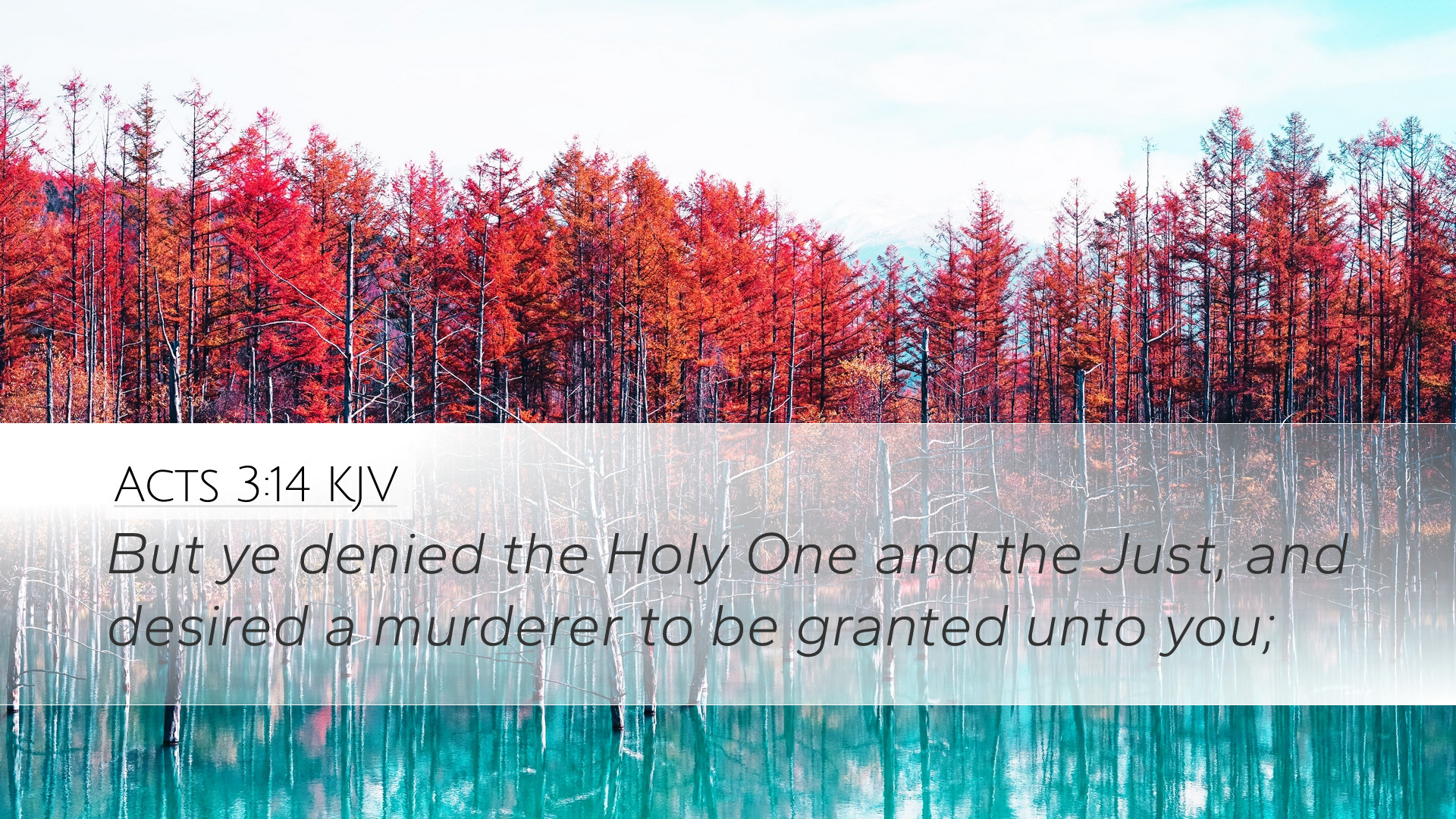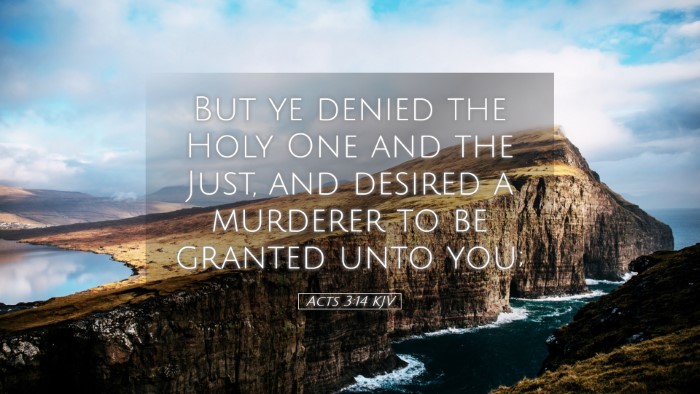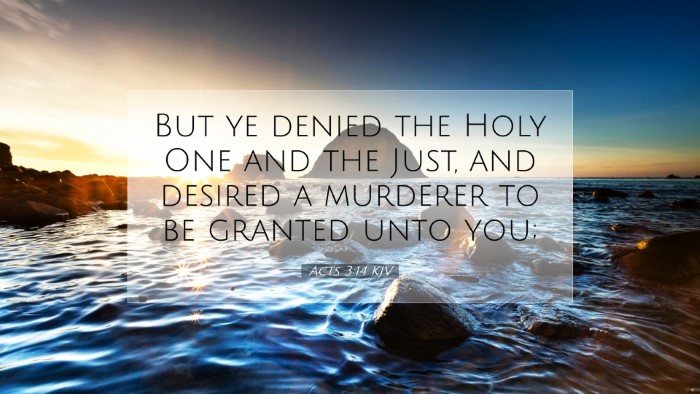Old Testament
Genesis Exodus Leviticus Numbers Deuteronomy Joshua Judges Ruth 1 Samuel 2 Samuel 1 Kings 2 Kings 1 Chronicles 2 Chronicles Ezra Nehemiah Esther Job Psalms Proverbs Ecclesiastes Song of Solomon Isaiah Jeremiah Lamentations Ezekiel Daniel Hosea Joel Amos Obadiah Jonah Micah Nahum Habakkuk Zephaniah Haggai Zechariah MalachiActs 3:14
Acts 3:14 KJV
But ye denied the Holy One and the Just, and desired a murderer to be granted unto you;
Acts 3:14 Bible Commentary
Commentary on Acts 3:14
Verse: "But ye denied the Holy One and the Just, and desired a murderer to be granted unto you;"
Introduction
Acts 3:14 is a pivotal moment in Peter's address at Solomon's porch following the healing of the lame man. This verse starkly contrasts the innocent Christ and the guilty Barabbas, highlighting the gravity of the choice made by the Jewish leaders and the populace. The implications of this choice reverberate through the narrative of Acts and challenge the conscience of every listener.
Denial of the Holy One
Peter begins by addressing the assembly, pointing out their role in denying “the Holy One.” Matthew Henry emphasizes that this term refers to Christ's sinless nature and divine mission. By labeling Jesus as "the Holy One," Peter elevates Him to His rightful position in the redemptive narrative, showcasing the stark contradiction in the crowd's actions.
Albert Barnes elaborates that the term “Holy One” is used throughout the Bible to denote God’s purity and separateness from sin. Thus, by denying the Holy One, the crowds display not only an injustice but a grotesque misunderstanding of who Jesus truly is.
The Just One
Referencing Jesus as “the Just,” reflects His righteousness and perfect adherence to divine law. Adam Clarke notes that this title signifies His role as a true source of justice, contrasting it with the injustice of their actions toward Him. The crowd’s choice reverberates as an indictment against their lack of perception regarding Christ’s true character.
Desire for a Murderer
The choice to prefer the release of Barabbas, a known criminal, over Jesus illustrates the depths of moral depravity inhabited by the people of Israel. Matthew Henry asserts that this choice wasn’t just an act of rebellion but also an embrace of wickedness in favor of righteousness. In desiring a murderer, they preferred darkness over light, reflecting humanity's age-old tendency to gravitate toward evil.
Albert Barnes elaborates that Barabbas serves as a symbol for the sinful nature of mankind. The name Barabbas itself means "son of the father," drawing a parallel to Jesus as the true Son of the Father but ultimately turned down in favor of a murderer. This replacement stands as a tragic irony that encapsulates human rebellion.
Theological Implications
The denial of Jesus poses significant theological questions regarding the nature of sin and redemption. Adam Clarke suggests that through Peter's address, Scripture is fulfilling itself, revealing a prophetic understanding of the people’s rejection of Christ.
Matthew Henry highlights that this rejection is not an isolated incident but serves as an ongoing truth throughout the New Testament. The question arises: How do we, today, deny the Holy One in our choices and actions? Every generation has its own Barabbas, the false gods we prefer instead of embracing Christ and the truth of His message.
Exhortation to Repentance
Peter’s message is not just a condemnation; it includes an exhortation to repentance. Matthew Henry articulates that this event paves the way for an understanding of repentance, emphasizing that recognizing our sinful actions is the first step toward redemption.
This theme of repentance becomes central throughout Acts, inviting listeners to transform their hearts and minds towards the true blessing of life in Christ. Albert Barnes mentions that true sorrow for sin would lead to an acknowledgment of their past mistake and a turning toward Christ, underscoring the redemptive hope available even after such profound rejection.
Application for Believers
For pastors, students, theologians, and scholars alike, the lessons from Acts 3:14 remain relevant. Adam Clarke argues that understanding the gravity of the crowd’s denial helps us grasp the seriousness of our own choices today. The juxtaposition of choosing Christ versus the ‘murderers’ or distractions in our own lives requires honest introspection.
Matthew Henry wisely cautions today’s believers to analyze their lives closely, ensuring they are not repeating the mistakes of the past. Embracing the message of Christ will challenge and refine us, pushing us toward a deeper understanding of holiness and justice in our walk with Him.
Conclusion
Acts 3:14 serves both as an admonition and a reminder. Albert Barnes concludes that it is crucial for Christians to acknowledge who Christ is and to not deny Him in practical, everyday actions. As students of the Word and shepherds of faith, we must be ever vigilant about the implications of denying the Holy One and the Just, confronting the ‘murderers’ within our culture that vie for allegiance in our hearts. This call to vigilance demands that we hold fast to the truth of Jesus Christ, ever ready to share His message of hope in a world increasingly prone to choose darkness over light.


